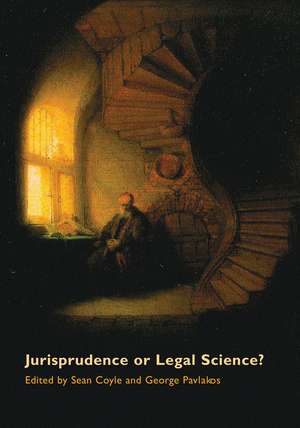Jurisprudence or Legal Science
Editat de Sean Coyle, Professor George Pavlakosen Limba Engleză Hardback – 30 mai 2005
Preț: 538.52 lei
Preț vechi: 772.93 lei
-30% Nou
Puncte Express: 808
Preț estimativ în valută:
103.06€ • 106.98$ • 85.93£
103.06€ • 106.98$ • 85.93£
Carte tipărită la comandă
Livrare economică 22 martie-05 aprilie
Preluare comenzi: 021 569.72.76
Specificații
ISBN-13: 9781841135045
ISBN-10: 1841135046
Pagini: 184
Dimensiuni: 156 x 234 x 14 mm
Greutate: 0.44 kg
Editura: Bloomsbury Publishing
Colecția Hart Publishing
Locul publicării:London, United Kingdom
ISBN-10: 1841135046
Pagini: 184
Dimensiuni: 156 x 234 x 14 mm
Greutate: 0.44 kg
Editura: Bloomsbury Publishing
Colecția Hart Publishing
Locul publicării:London, United Kingdom
Notă biografică
Sean Coyle is a Reader in the Faculty of Law at University College London.George Pavlakos is Lecturer in Jurisprudence at Queen's University Belfast. From summer 2007 he will be Research Chair in Globalisation and Legal Theory at Antwerp University.
Cuprins
IntroductionGeorge Pavlakos and Sean Coyle 1. Two Concepts of Legal AnalysisSean Coyle2. The Truth of Legal AnalysisJonathan Gorman3. The Nature of Legal PhilosophyRobert Alexy4. Method in Law: Revision and DescriptionVeronica Rodriguez-Blanco5. Normative Knowledge and the Nature of LawGeorge Pavlakos6. Law's Claim to CorrectnessCarsten Heidemann7. Can Jurisprudence Without Empiricism Ever be a Science?Philip Leith and John Morison
Recenzii
This is a volume that is important and often exciting...we have a book in our hands that is worth reading and reflecting on.
Reading this book - carefully and critically - helps in clarifying these complex relationships between method and substance and between legal philosophy and other areas of philosophy, issues about which legal philosophers are still much in the shade.
.one of the main attractions of Jurisprudence or Legal Science is that it invites the reader to think along with the authors.
If we focus on this last opposition (legal theory as a study of the nature of law vs. legal theory as a situated enquiry of specific legal practices) we are in the best condition to both have a full grasp of the dilemma dealt with in Jurisprudence or Legal Science? and appreciate the originality of the contributions comprised in this volume.
As a whole, the contributions of the volume demonstrate at a high level the complexity of the topic as well as the various jurisprudential problems that are linked to it.
Reading this book - carefully and critically - helps in clarifying these complex relationships between method and substance and between legal philosophy and other areas of philosophy, issues about which legal philosophers are still much in the shade.
.one of the main attractions of Jurisprudence or Legal Science is that it invites the reader to think along with the authors.
If we focus on this last opposition (legal theory as a study of the nature of law vs. legal theory as a situated enquiry of specific legal practices) we are in the best condition to both have a full grasp of the dilemma dealt with in Jurisprudence or Legal Science? and appreciate the originality of the contributions comprised in this volume.
As a whole, the contributions of the volume demonstrate at a high level the complexity of the topic as well as the various jurisprudential problems that are linked to it.
Descriere
In a series of new essays the authors attempt to answer important questions about the nature of jurisprudential thinking.
